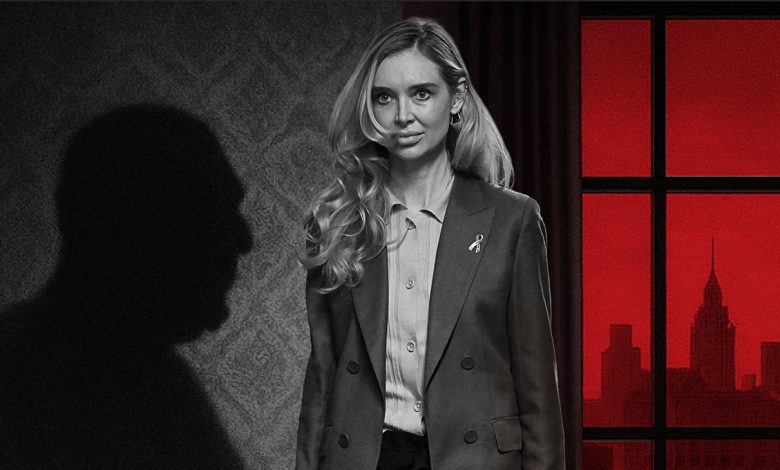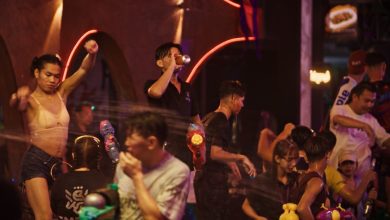Anonymous No More: Inside the Complicated Life of Harvey Weinstein’s Key Accuser

It’s the sequel no one expected. Harvey Weinstein is being retried for alleged sex crimes against two women—former production assistant Miriam “Mimi” Haley and aspiring actress Jessica Mann—in New York City, where his convictions on those same charges suffered a rare overturn exactly a year ago. Only this time, a third woman is joining them on the stand, a hitherto anonymous complaining witness whose testimony could prove critical. Her Jane Doe identity was finally cast off on the trial’s splashy opening day, when she revealed herself to be a Polish former runway model turned psychotherapist named Kaja Sokola, who has accused the once all-powerful Hollywood producer of sexually assaulting her in a Tribeca hotel room in 2006.
Rebutting these allegations before a jury last month, Weinstein’s lead trial attorney, Arthur Aidala, has said that his client had long-term relationships with Haley, Mann, and Sokola, suggesting every one of these women was willingly “fooling around” as she looked to “cut the line” to stardom.
One of the chief reasons Weinstein’s 2020 conviction in the initial trial was scrapped on appeal was the prosecution’s parade of Molineux witnesses—a lineup of three women recounting prior bad acts of Weinstein’s, all claims of assault, but none of them criminally charged. Effectively denied a second lineup of such witnesses to establish Weinstein’s alleged patterns of abuse, Manhattan’s D.A., Alvin Bragg, sought out at least one more female who could be tied to formal charges in the do-over.
Prosecutors also likely anticipated fatigue in the press with what would now be Haley and Mann’s twice-told tales; the benches for courtroom spectators have hardly been elbow-to-elbow this go-round, and a fresh face would spur bigger news coverage, certainly.
Watching Harvey Weinstein’s sex-crimes conviction get overturned surely rankled the Manhattan D.A.’s office. The mortally ill movie producer could have been dispatched to Los Angeles to begin his 16-year sentence for his rape conviction there as he awaits results of his appeal on that case. But Bragg is up for re-election, and taking Weinstein down could help wipe recent memories of acquitted subway vigilante Daniel Penny and hush-money backhander Donald Trump slipping through the Office’s fingers. Bragg himself sat second row as Assistant District Attorney Shannon Lucey staked the government’s revised case against Weinstein.
Weinstein is weak from leukemia and dank jail cells, his heart and finances barely stuttering along as New York City Health + Hospitals continue to argue he should be back at Rikers Island jail instead of at Manhattan’s Bellevue Hospital prison ward. He is on what looks to be the last of his nine lives. But his lawyers, pointing to apparent inconsistencies in Sokola’s account, believe the new case is far from open-shut. And in addition to the alleged 2006 assault against Sokola for which Weinstein has been formally indicted, prosecutors appear to be relying, as they did last time, on shocking accounts of another assault for which Weinstein is not being charged.
All of which is to say, he could beat this rap. Again.
***
It was spring 2006 when Weinstein took a hurried lunch at the Tribeca Grand Hotel’s restaurant with the nearly 20-year-old Sokola and her cardiologist sister, who was visiting. Prosecutors say Sokola wanted to “show off” to her sister that she knew Weinstein, so determined was she to prove she was making headway toward an acting career.
As prosecutors tell it, Weinstein suddenly told Sokola he had to go. But there was a script in his hotel room he wanted to quickly show her.
This is where, Sokola claimed on the stand, Weinstein removed her boots and stockings and pushed her down onto his bed as he forced oral sex on her, ignoring her cries of “please stop, I don’t want this.”
(Weinstein denies he ever had anything but consensual sex with any of these women.)
Last September, a grand jury accused Harvey Weinstein of a criminal sexual act in the first degree, the same charge Weinstein was initially convicted of back in 2020, when it was applied to former production assistant Miriam Haley. In this case, there is no exact date for said incident, but rather a range: “from on or about April 29, 2006, to on or about May 6, 2006.”
The year of the alleged attack Weinstein finds himself charged with today — 2006 — was a period during which Sokola “was not well,” the prosecutor allows. She was drinking heavily. She’s a woman “with many personal struggles that never seem to subside,” was the A.D.A.’s sum-up on opening day. While acknowledging that “Kaja’s issues are not all Harvey Weinstein’s fault,” A.D.A. Lucey asserted that Sokola’s very first alleged run-in with Weinstein in 2002 — when the model and aspiring actress was 16 — “changed Kaja in ways that she is still dealing with today.”
Prosecutors are alleging Sokola had met Weinstein earlier that year at a dinner at then-happening NoHo restaurant Butter, the kind of place where hired promoters imported models to come “and be photographed around rich older people at the club,” in the D.A.’s version of events. (Weinstein’s attorneys disagree on the timing of their first meet. They postdate it to 2005, reassigning Sokola to a non-minor status.)
Though her identity was withheld in the lead-up to the current trial, Sokola had already gone public about her early encounters with Weinstein years ago. In a 2018 class action suit where she was “Jane Doe,” she claimed that Weinstein had forced her to give him a handjob in 2002, making her the youngest alleged victim of his depredations. It was the beginning of what she would characterize as “a decade” of sexual and emotional abuse.
Toward the end of 2019, Sokola exited from the initial class-action suit, citing “insufficient compensation for the victims” among other things. In a second civil lawsuit, from 2019 with her name openly attached, Sokola targeted Disney (which had owned Miramax in 2002); the entity of Miramax; Harvey; and Harvey’s co-CEO brother, Bob. It was quietly settled for $3 million in summer of 2023, publicly-traded Disney doubtlessly under pressure to make it all go away. (Sokola had earlier received an additional half million from a Weinstein Company bankruptcy-proceeding settlement fund paying out other complainant women including members of the class action she’d bailed on, utilizing the Tribeca Grand incident—the full details of which had yet to be made public.)
As lurid as the claim of sexual assault against a minor may be, prosecutors in the ongoing criminal trial have declined to charge Weinstein for the alleged 2002 encounter, perhaps due to such inconsistencies of timing, on which the defense have pounced: Sokola has noted that the apartment where all this occurred was on Crosby Street in Soho, But as the defense will likely point out , property records show that Weinstein only purchased the Crosby Street apartment in May 2005, when he was going through a divorce. In 2002, his primary residence was the duplex apartment on Central Park West he shared with his then-wife, Eve.
An assistant to photographer Marco Glaviano who’d met Sokola in Milan has sworn out an affidavit (which got some press back in 2022) that recalls an afternoon in 2005, when she was working at Glaviano’s hybrid office-residence in New York’s CitySpire building. She and Kaja Sokola were staying here, Sokola admits on the stand. Glaviano’s assistant, one Helga Rose Samuelsen, recalls looking up from her computer and being stunned by the sight of her 19-year-old aspiring-actress pal ushering Weinstein into the apartment, and then: “into her room.” The assistant felt sure the two could have only recently met. Yet Sokola denied last week she’d even seen Harvey Weinstein that calendar year, stating, “That never happened.”
In addition, prosecutors could produce no emails or phone records proving these two knew each other before 2005. Weinstein maintains that Sokola was an acquaintance of just seven years, tops.
Meanwhile, neither of Sokola’s prior civil lawsuits mentioned the crime that Weinstein is now being accused of, namely the alleged 2006 sexual assault at the Tribeca Grand. In her 2018 class action, Sokola said that Weinstein had invited her up to his hotel room after the lunch but that she had “refused, giving the excuse that she could not leave her sister.” In 2025, that story has a new ending, which will be key to the prosecution’s revised overall case. Weinstein attorneys, on the other hand, are seizing on the inconsistencies, the red meat of any defense.
***
The defense’s strategy will be to call Sokola’s credibility into question by highlighting discrepancies in her testimony over the years, and by pointing to her struggles with alcoholism and mental health. Assistant D.A. Lucey acknowledged these problems in her opening statement, conceding that Sokola is someone who “takes one step forward and, sadly, two steps back.” But she’s arguing that Sokola’s history does not change the facts of the case.
Sokola is also now facing an array of child-custody issues in the United States and in Poland that already have impacted her appearance in this trial. In 2022, Sokola’s husband — who lives in Poland — filed a petition in federal court demanding the return of their sole child, whom he says she absconded with to New York City that January. In September 26, 2024, a decision against her in a divorce action Sokola began in Poland awarded full custody of her one child to her husband until their divorce resolves. Yet the registration of this temporary custody order from Poland (where the child and Sokola are citizens)—usually an expedited process—has been delayed for months by New York City Family Court. The husband’s lawyer, Michael S. Pascazi, believes the matter was deliberately slow-walked so Sokola could remain in the U.S.
The day before the Weinstein indictment was unveiled, the District judge overseeing the husband’s case ruled that the child could stay here in the United States, citing the husband’s alleged physical and psychological abuse of Sokola (and, in a vastly limited capacity, her son), as well as this husband’s criminal history in France and elsewhere.
But neither the defense nor the prosecution has mentioned that Sokola threatened suicide right around the time she gave grand-jury testimony, in August 2024. These incidents, and the involvement of alcohol, caused her to lose custody of her child to a foster caretaker for the next few months.
Sokola has applied for asylum in the United States on the grounds that she and the child were “victims of violence.” That application is still pending.
In opening arguments for the Weinstein trial, prosecutors announced Sokola was now in contention for something called a U visa. The U visa is “intended for victims of certain crimes who have suffered mental or physical abuse and are helpful to law enforcement or government officials in the investigation or prosecution of criminal activity,” according to the United States government web page on the topic. Asked about this on the stand last week, Sokola conceded that under this program, if one reported a crime and cooperated with prosecutors, these prosecutors could fill out a form supporting one’s application for a U visa to remain in the United States. She agreed that if her asylum application is not granted, that U Visa application would be “dependent on the District Attorney’s support.” The Manhattan District Attorney’s office and Sokola’s attorney Lindsay Goldbrum at Goddard Law declined comment on the U visa’s influence on this case.
***
After her 2019 civil lawsuit, in which she was the sole named plaintiff, Sokola billed herself as “one of the most public faces of the Me Too movement” on one of her professional websites. It appears she was first interviewed in 2020 in the Polish press as an alleged victim of Weinstein, and again, two years after that, for a 2022 Rolling Stone profile, her story then bouncing around major media. That year she walked the red carpet at both the New York and Los Angeles premieres of the Weinstein-scandal movie She Said.
She has blogged about her troubles and addictions on a (now removed) Polish-language website that also advertised her services as therapist. The posts reveal a woman disappointed to have not achieved spektakularnych sukcesów—spectacular success, a phrase used more than once.
Prosecutor Shannon Lucey portrays Sokola as a product of her upbringing: Sokola’s mother and sister enter her at 14 in a modeling contest she wins, enjoying their bragging rights to having a “pageant princess” and successful model in the gene pool. And along comes Harvey Weinstein, with his ostensibly credible So you wanna be in the movies? spiel.
According to Sokola’s blog, Modeling was always just a stepping stone. Her dream, she said, was always to write and act: “When I left for the US a hundred years ago, I was thirsty for all that America has to offer, a high-speed career, spectacular success, and the happiness that comes with being in the limelight,” she wrote.
Harvey Weinstein “knew how addictive Hollywood dreams were,” said the prosecutor on opening day, as the defendant assiduously avoided eye contact with the jury.
Sokola had decided to forego university in 2006 in order to get traction as an actor. She says her professor mother told her it was the “dumbest decision of [her] life” and gave her the silent treatment. (A source close to the family says that’s not true.) She says that Weinstein, with his talk of acting, “was this anchor” of a person who still believed in her, “truly seeing the potential.”
Around the time of Sokola’s 20th birthday, her older sister Ewa passed through town. Sokola hoped that after lunching with her and Weinstein, Ewa “would not treat me like a joke,” she said. But then, Ewa, “being the amazing cardiologist that she is,” told Weinstein he’d do well to drop some weight for the sake of his health, also wondering aloud why European actresses seemed so ill-used in American films.
Sokola had hoped Ewa would relay to their mother that, with such a powerful ally in the business, Sokola had a chance to make it. She says she never told any family members about the assault she now alleges took place minutes later in the upstairs hotel room.
In the days that followed, Weinstein sent along some old films on DVD for Sokola to watch to further her education, accompanied by a warm birthday card where he misspells her name—with a “Y.” She didn’t rip it up; the family had hung onto it, and it was presented at court. Sokola seemed reluctant to admit on the stand that it was Weinstein who had a senior VP at his company write her a recommendation the following month for the Lee Strasberg Theatre & Film Institute. She now claims she was unable to afford the quoted $3,000 tuition in this period.
In November 2011, the 25-year-old Sokola emailed Barbara Schneeweiss, a principal assistant to Weinstein and creative executive at the Weinstein Company. In fractured English, Sokola said she was looking to be connected with an agent. Schneeweiss forwarded the request onto Weinstein who replied with distinct under-enthusiasm, “Get out of this in a nice way.”
“Her career never got to the next level, and she’s blaming him,” said Weinstein attorney Aidala in opening arguments.
“He never done anything to help me get my foot in the door,” Sokola testified last week, plainly enraged, voice raised. “After many years of, as I felt, being fooled by Mr. Weinstein, I stopped believing that I can do [acting].”
Sokola said on the stand that “acting was a passion since I was a child,” but a source close to the family reports no stabs made at any acting in Poland. (Though she won a few certificates for dramatic recitations of poetry, introductions to a major drama school there were rejected out of hand.) Being “famous” was a preoccupation. Her diaries are being fought over in the courtroom, what can come into evidence. A source close to the family suggests they contain talk of Jeffrey Epstein’s island — and little that’s damning about Weinstein.
Sokola was asked in court about a section of the diaries dating from 2015, devoted to situations and traumas she’s experienced with various individuals. Her “trauma” experienced at the hands of Harvey Weinstein, she’d written, was “promising me help and nothing came of it.” But the traumas she’d listed for two other men were, respectively, “rape, physically aggressive” in one case, and in another, “forcing sex.”
In 2022, Sokola told in Rolling Stone that Weinstein had said he had a part for her in a movie “with a huge actress, a ginormous movie.” At trial, she acts observably put out remembering this gig sometime in the spring of 2006 — as an extra on The Nanny Diaries: “It was bittersweet…an opportunity, I guess, to see how a big movie set operates. [But] not a role-role.” The scene wound up cut from the movie.
A 2011 email to Weinstein kicks off, “I remember you mention me about [Annapurna Pictures CEO] megan ellison. Could I get in touch with her now?” Sokola talks up a “thriller drama about sex slavery” she wants to produce. She tells Weinstein about “my short broken drems [sic]” and writes that she’s feeling “much stronger after dealing with my weakness,” an allusion she says in court to “mental health problems.” (A teal-colored enamel ribbon pin worn every day on Sokola’s collar signals her support for those suffering from mental illness.)
“I wanted him to be honest with me,” she said from the stand, “and if he said that I had potential, that I had gift, that I had talents, to prove it by introducing me to casting directors, nothing else.” She raised her voice angrily: “I wanted honesty from Mr. Harvey Weinstein and never got it and it was heartbreaking….He broke my dreams and my self-esteem and my trust and belief in myself.”
***
Not long after Sokola’s appearance before the grand jury in the summer of 2024, crisis almost imperiled the D.A.’s case.
Court documents attached to the federal child-abduction case indicate police were summoned to Sokola’s apartment downtown twice in the week before her appearance in court. Sokola, who had allegedly been drinking alcohol, was hauled off to a psychiatric facility and lost custody of her child to foster care for the next few months, according to a bench order issued by New York City Family Court.
Sokola in fact has a significant history of psychiatric hospitalizations, both in Manhattan and in Poland, as documented in records attached to the federal-court filings by her estranged husband.
The records date from February 2007 and come from Sokola’s doctor-sister, Ewa. Sokola’s attorneys object in a filed response to Ewa’s having “circulated, without permission, [Sokola’s] medical records”, but do not dispute their veracity, instead pointing out these records predate the marriage and so are irrelevant to the action.
Among other revelations, these records recount an incident when a highly intoxicated Sokola, 20 years of age and fighting with a friend, hurled a garbage bag from the window of her East Village apartment building, a 911 call alerting police. In the ensuing report from Cabrini Medical Center’s psychiatric-emergency service (where Sokola was taken by ambulance for evaluation) she was diagnosed with “bipolar personality traits.”
In years that followed, other official reports detail admissions voluntary and involuntary to psychiatric hospitals and an addiction center, citing anorexia and bulimia (from age 14), cuts at the wrist she denies are any suicide attempt, an “emotionally unstable personality of the borderline type,” “harmful alcohol use with addictive features,” and a patient who has “undergone private detoxification several times.”
A 2011 questionnaire completed by her retired-professor mother in Poland requesting drug-treatment coverage for Sokola from that nation’s government mentioned a suspected suicide attempt by Sokola preceded by farewell emails and talk of her own funeral. Sokola had been training intermittently to be a psychologist but had hardly left the house for months, her mother stated, blaming Sokola’s modeling years, the “easy access to alcohol and nightlife in many of the world’s capitals.”
After her 2015 marriage to a businessman within days of meeting him in person off an interaction on Facebook, she went sober, even if the relationship ultimately implodes spectacularly in 2022.
In late 2024, two of Sokola’s siblings filed startling written declarations to federal court. Sokola’s much older half-sister, Hania, claimed Sokola invited her to come to New York in the summer of 2022 —shortly before Sokola would go public on the Weinstein matter—to help her dry out. Hania reported that Sokola was drinking to excess, often passed out to the point she could not be awakened, her young child scrambling around her apartment with the windows open. There is no reaction to the particulars of Hania’s statement in a filed response by Sokola’s federal-case attorneys. While refusing to comment on anything specifically, in a letter to The Hollywood Reporter, Sokola’s personal attorney, Lindsay Goldbrum, said that such details “have no bearing on the real question posed by Mr. Weinstein’s retrial: whether he sexually assaulted Ms. Sokola in 2006.”
In one of her several declarations to the New York federal court (and also in testimony to Poland’s Family Court), Sokola’s cardiologist sister Ewa maintained she, too, was invited to stay with Sokola in August of 2024 to help her dry out (they would both be testifying before the grand jury), and that she brought the withdrawal drug baclofen and IV-drip equipment in her luggage. In one declaration, Ewa states she was present in the apartment on August 27, 2024, when she witnessed her inebriated sister being cuffed by police officers for her own protection after threatening to jump from the high-rise balcony. Ewa also relates the goings-on that day to police in a cellphone video capturing sister Kaja being put in handcuffs. (The video was viewed by the Hollywood Reporter.) A New York City Family Court bench order from August 28 mentions police and emergency personnel removing Sokola to a hospital for psychiatric evaluation.
The bench order also directed the removal of Sokola’s five-year-old to foster care, deeming the child “neglected” and confirming Sokola’s latest “psychiatric hospitalization,” as well as the presence of police “due to the mother drinking alcohol and expressing suicidal ideation in front of the child.”
In court papers that fall arguing the federal proceeding launched by Sokola’s estranged husband should not be re-opened, Sokola’s lawyers had claimed her admitted “relapse into misuse of alcohol…and temporary mental health decline thereafter” was irrelevant to the question of whether it would be better for her child to be repatriated to Poland and his father. These ominous health issues are “not admitted” by Sokola in her response, though she acknowledges she is “actively engaging in regular out-patient recovery programs and is making good progress” and “continues to have regular access to [her child].”
A special settlement with ACS around Thanksgiving determined the child should be returned to Sokola.
“God damn, I feel like a crappy parent so often,” Sokola posted on Facebook at Christmastime in 2024.
***
Criminal charges related to the alleged 2002 incident could have been brought any time after August 2019, given the passage that month of New York’s Child Victims Act extending abused minors a year’s grace in coming forward. But the State, to date, has never charged Weinstein with the alleged Child Victims Act offense.
The single incident Weinstein is today charged with relating to Sokola was not part of either of her prior two civil-lawsuit filings. The story is derived from a truncated original version in an early lawsuit, and an allegation first appearing in private 2021 paperwork for the bankruptcy proceeding settlement. Sokola’s lawyer Lindsay Goldbrum admits, “she has previously chosen not to publicly share this painful portion of her experience.”
She met remotely twice with the D.A.’s office after Weinstein’s first trial had already commenced. And some notes were taken—none by the police detective in the room—with no police investigation then instigated. The Manhattan District Attorney and Sokola’s attorney Lindsay Goldbrum had no comment.
“I just wanted to share what happened,” is how Sokola explains those meetings on the stand. She admits that “not in my wildest dreams” had she ever contemplated testifying in a criminal proceeding against Harvey Weinstein. But here we are.
Source: Hollywoodreporter
HiCelebNews online magazine publishes interesting content every day in the celebrity section of the entertainment category. Follow us to read the latest news.
Related Posts
- All About Danielle Staub's Daughters, Christine and Jillian
- Taylor Swift's 'really special' introduction to Travis Kelce's new family member revealed
- At Diddy Trial, Ex-Girlfriend Cassie Details “Disgusting,” “Humiliating” “Freak-Off” Sex
- Jimmy Kimmel Roasts His Employer and Boosts ‘60 Minutes’ at Disney Upfront
- Krysten Ritter Joins ‘Daredevil: Born Again’ Season 2, Reprising Jessica Jones





